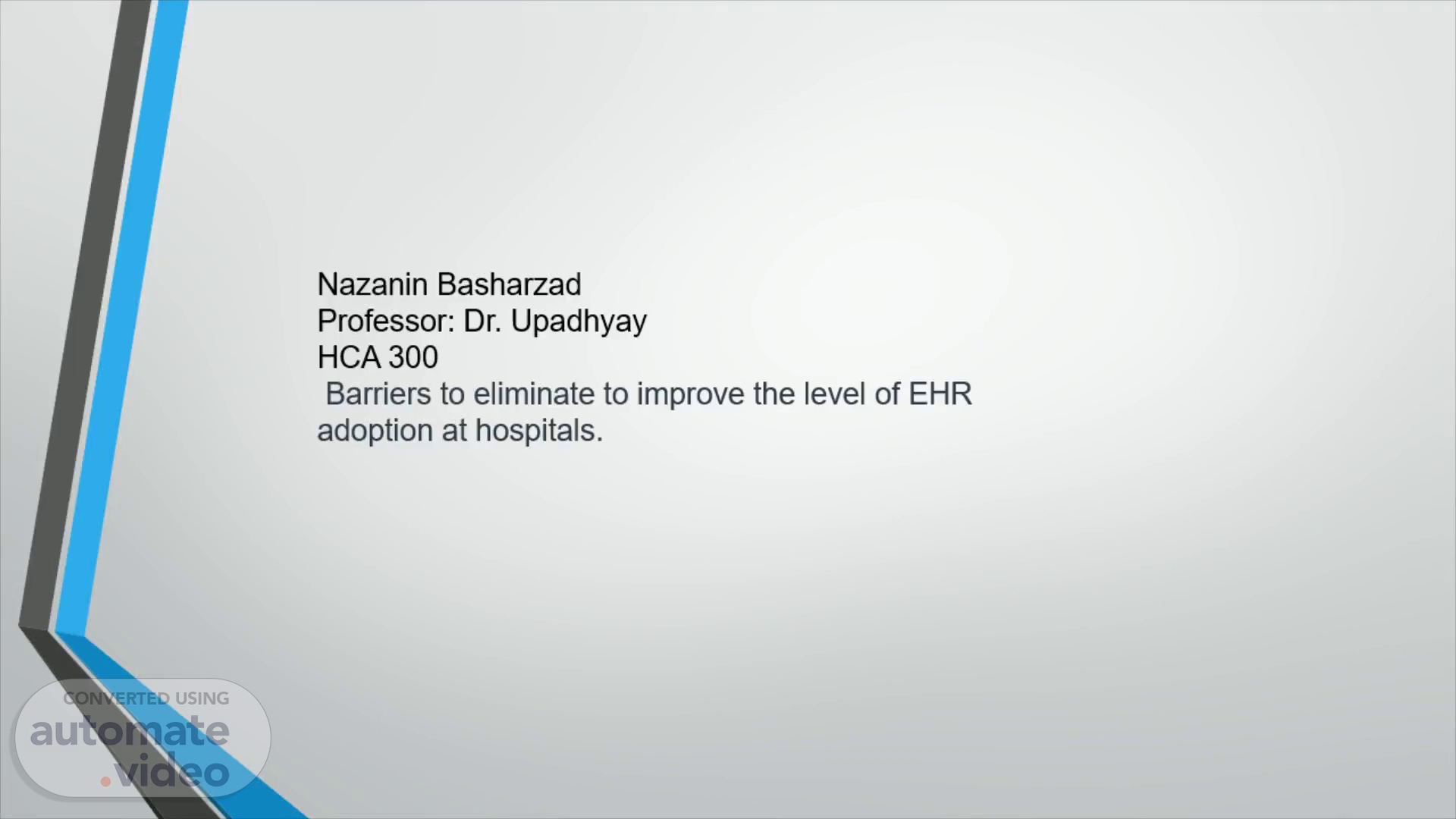
PowerPoint Presentation
Scene 1 (0s)
Nazanin Basharzad Professor: Dr. Upadhyay HCA 300 Barriers to eliminate to improve the level of EHR adoption at hospitals..
Scene 2 (10s)
There are many barriers that healthcare management can help to eliminate to improve the level of EHR adoption. These barriers are high cost, absence of computer skills, less confidence in security and confidentiality, training staff, concern about installation costs, and medical errors(“NCBI - WWW Error Blocked Diagnostic,” n.d.-b)..
Scene 3 (28s)
The cost of installing and maintaining EHR systems is one of the most significant barriers to adopting electronic health records. Many physicians are afraid of the cost and are concerned. The study by the federal agency for healthcare research and quality found the average price of maintenance costs are about $1500 per physician per month, and the cost of installation is about $32.606 per physician. Leaders said the cost of EHR systems would decrease once national standards are in place and manufacturers compete against each other(“Cost Is Biggest Barrier to Electronic Medical Records Implementation, Study Finds,” n.d.). As a healthcare manager, I would lower the spending in different areas and keep the budget for the EHR system. Hiring someone knowledgeable in information technology can also save money for the maintenance of the system..
Scene 4 (1m 4s)
The absence of computer knowledge is another barrier to implementing an EHR system. There are many ways to avoid this issue, such as training staff and evaluating their computer literacy. We can always use the vender's educational material for training the team. Receiving feedback from the group and finding their weakness and strength in using the EHR system will allow the management to find solutions for their fault and turn them into computer savvy (“How to Train Your Staff on Using an EHR,” n.d.) ..
Scene 5 (1m 29s)
Worrying about the security and confidentiality of the information of clients and providers can become a barrier to implementing the EHR system. Under HIPAA, management is responsible and accountable for the action of their employees. One way to avoid the issue is to make sure people who access the system are authorized and well-trained. Changing the passwords regularly and limiting what everyone sees on the system will protect the information and bring peace of mind for all personnel and patients (Harman, 2012) ..
Scene 6 (1m 53s)
Medical errors can happen with using the EHR system or without it. Many healthcare providers worry about medical errors and avoid implementing the EHR system. There are many solutions for the issue, such as training the staff to enter the data correctly and using data to reduce the risk. Data can show the organization's weaknesses, and metrics help avoid errors. Many mistakes happen not because of the technology but because the staff is not well trained or overworked. Management should watch staff's worked hours carefully. As a manager, I will schedule staff with eight hours of space between shifts. (Saremi, 2013)..
Scene 7 (2m 21s)
References: How your EHR can help you avoid medical errors. (n.d.). Retrieved March 17, 2022, from https://www.ehrinpractice.com/how-your-ehr-can-help-you-avoid-medical-errors-711.htmlNCBI - WWW Error Blocked Diagnostic. (n.d.-b). Retrieved March 17, 2022, from https://www.ncbi.nlm.nih.gov/pmc/articles/PMC3766548/NCBI - WWW Error Blocked Diagnostic. (n.d.-b). Retrieved March 17, 2022, from https://www.ncbi.nlm.nih.gov/pmc/articles/PMC3766548/Saremi, M. (2013, November 10). Subjective fatigue and medical errors among nurses in an educational hospital. Retrieved from https://ioh.iums.ac.ir/browse.php?a_id=805&sid=1&slc_lang=en.